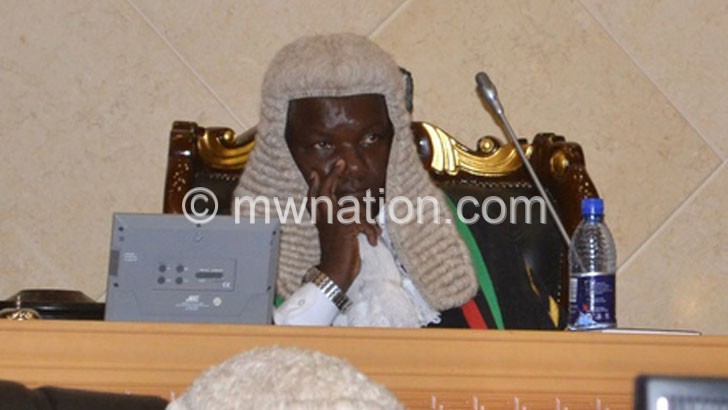‘Ignore press freedom at own peril’
On May 3, the country’s media fraternity joined the rest of the world in commemorating the World Press Freedom Day. However, the commemorations here reached their climax last Saturday with an awards gala dinner at the Bingu International Convention Centre (BICC) in Lilongwe. Speaker of the National Assembly RICHARD MSOWOYA was the guest of honour at the event and spoke about the crucial role the free press plays in society. Our reporter FATSANI GUNYA later caught up with Msowoya to find out why when some politicians hate the free press, he thinks the media has a key role in development. Excerpts:

The day this year has been commemorated under the theme ‘Fostering Media Freedom’. How does it resonate to you as a veteran politician and Malawi’s socio-economic development?
The theme that has been chosen for this year’s commemoration is, in my view a call to action, first and foremost to the media practitioners in the country to develop critical thinking required in critical times. The implicit message in that theme is that we are in critical times and, perhaps it is important that we all understand what makes these times critical. I would like to think that these are critical times for Malawi, because exactly two months shy of our 53rd anniversary as an independent State, we are still rated among the world’s poorest countries.
We may have enjoyed relative peace, but we are still a nation so blatantly divided along regional, ethnic and political lines. Diversity is a good and beautiful thing, but in our case it has created divisions that continue to pull us backwards. The media, like several other stakeholders, has had a role to play in this. Our history is replete with examples of how the media has been used by various groups to promote interests that run counter to peace, justice and inclusiveness.
Over the years, media houses and practitioners that have chosen to stand out and fight this have been victimised in clear and sometimes subtle ways, so that their voice of reason should not prevail. That is why in pursuit for press freedom in this country, the media needs to be very strategic and forge effective alliances with other players.
Talking of responsibility, what is your personal understanding of what a responsible media ought to do in a democracy?
A responsible media should never owe its allegiance to any narrow or sectarian interest, including those of the practitioners themselves. The power that the media wields would only be meaningful if it is used to benefit the wider interests of the nation. In the words of Tom Stoppard, “A free press needs to be a respected press,” and, as we all know, respect is earned.
Just to cite one example, we are all aware that one of the major vices besetting this country is corruption. The media has, so far, done quite a commendable job in exposing corrupt practices at various levels of public life and there are issues that would have gone unattended to if it were not for the media. That is something for which the country’s media deserve congratulations, but for one to be seen as a responsible media, they should lead by example by desisting from engaging in corrupt services. It is always disheartening to hear stories of media practitioners seeking or receiving bribes to pursue, twist or even kill certain stories.
Do you think there is some way you can help improve the current status quo?
Like I said, this needs multi-sectoral approach and one such player is Parliament, which I believe, needs to build a mutually beneficial relationship with the media. I must declare that as Speaker of the Parliament of Malawi, I am a very strong defender of press freedom; not only because it is enshrined in the Constitution which I swore to defend and protect, but more importantly, because I believe in it.
I believe that any country that wants to move forward needs a free and responsible media. And because these terms are understood differently by different people, I am compelled to expand further. I think the definition of press freedom by Ben Lieberman in 1953; in his book Restating the Concept of Freedom of the Press is closest to my understanding. He defines freedom of the press “as the right to serve, without government interference and with police protection, [in pursuit of] the most fundamental right of freedom of information.”
Parliament recently passed the Access to Information Bill, which is a vital law in relation to media freedom in the country. Should we be smiling over such unquestionably important milestones in ensuring press freedom in this country?
If I were you, I would not be cautious; the job is far from being done. Passing a Bill into law is just one step – admittedly a very important step, but both Parliament and the media fraternity need to work together to ensure that the objectives of the two pieces of legislation are met.





